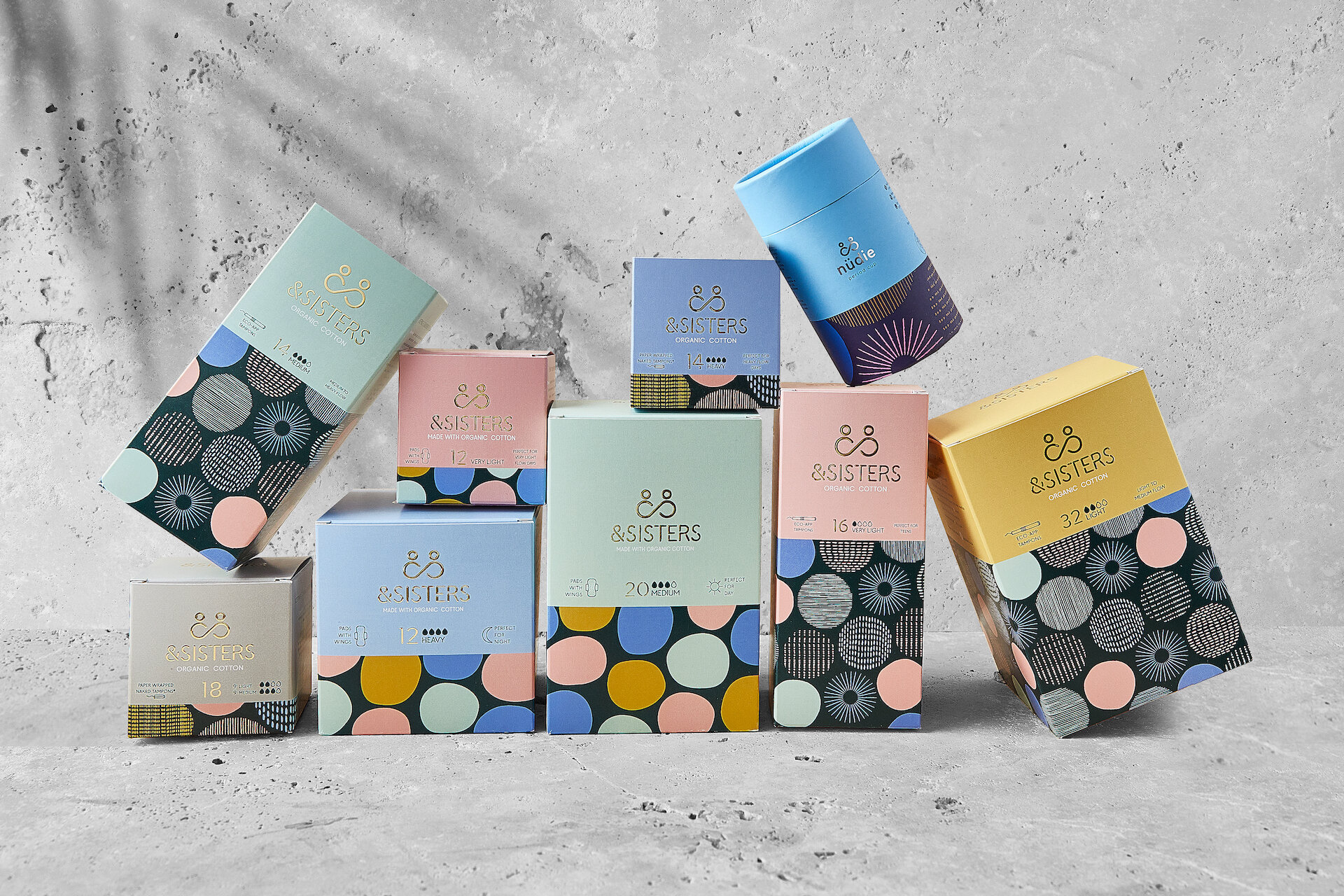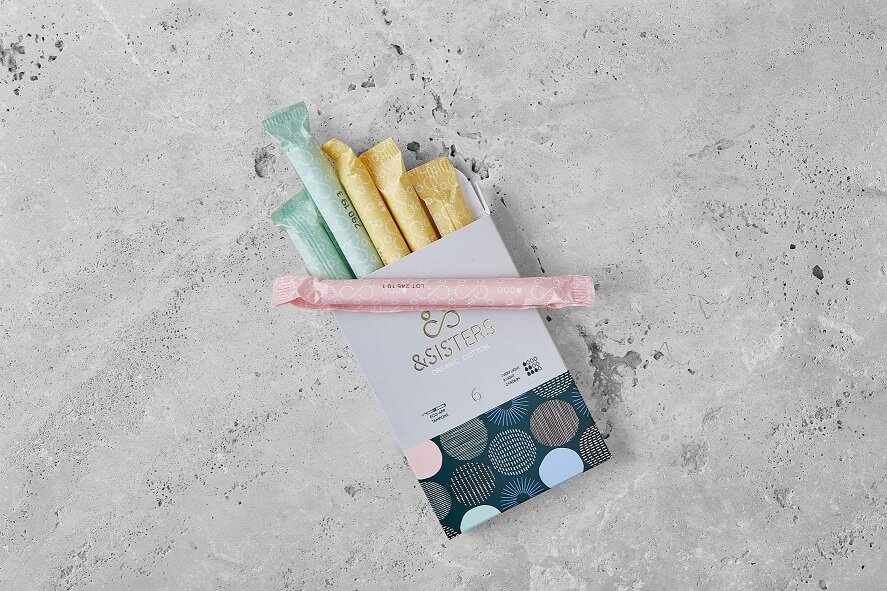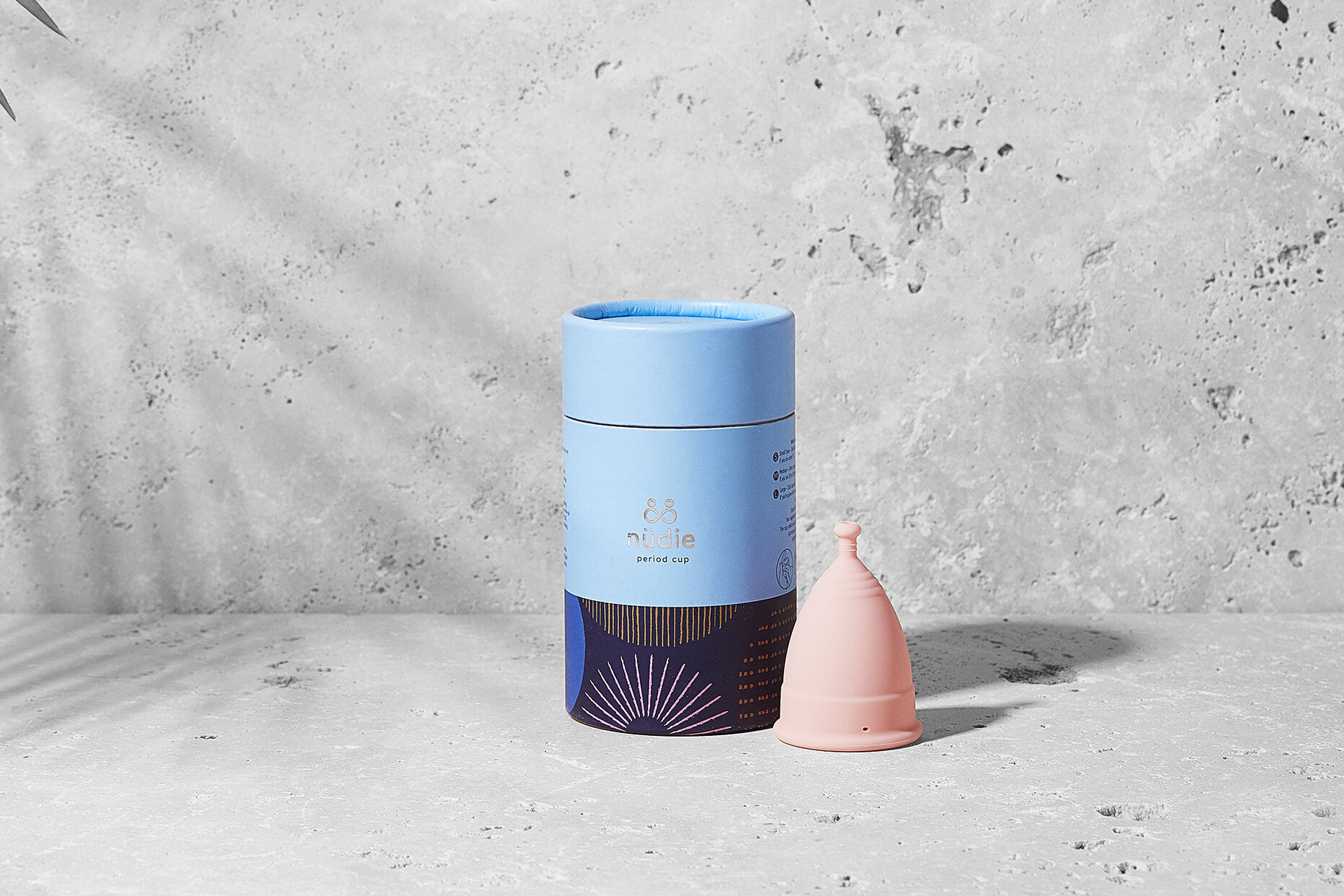WoW Women in FemTech I Lucy Lettice and Claire Lettice, co-founders of &Sisters
Lucy Lettice and Claire Lettice are the co-founders of &Sisters.
&SISTERS is on a mission to build the world’s first menstrual health ecosystem, helping menstruators navigate the biological, psychological, and social symptoms directly linked to the menstrual cycle at every stage of life. Their sustainable products and services, powered by smart technology, serve to empower and inform the community of sisters to take care of both homes: their bodies and the planet. No matter your life stage, from the first period through to post-menopause, &SISTERS is here to help you thrive in sync with your menstrual cycle. They are leveling the playing field, supporting women's health, education, and economic empowerment across the globe through our giveback initiatives.
Prior to starting &SISTERS in 2017, Lucy Lettice carved out a career in buying and working with eco retailers, including working with a zero-waste start-up and a larger corporate. For Lucy, &SISTERS has provided a short-course entry into the world of tech, and some personal highlights up to now have included watching the team grow to a seven-strong force, being shortlisted as a finalist in the Health & Wellbeing Awards 2021, and recently featuring in the Top 10 Sustainable Tech Companies and Start-Ups by TechRound UK.
Through &SISTERS, Lucy is on a mission to change all of this and the last six months have filled her with hope for the future as &SISTERS has officially become part of both the Innovate UK Edge program and the 2021 Fall Cohort of the FemTech Lab accelerator.
&SISTERS co-founder, Claire Lettice, has over 30 years of experience in marketing and advertising. Before &SISTERS, Claire worked with a wide number of organisations, including Samsung, Colgate, and Reckitt Benckiser, advising on brand strategy and planning. Alongside this, Claire has also previously launched several new business ventures, including a ‘mix-your-own ‘muesli business and a botanical chill-out drink which gave her a taste of life as an entrepreneur and spurred her on to launch &SISTERS. In her spare time, Claire is an avid gardener and enjoys trying to fill every patch of soil in her garden with fragrant plants. She is currently on a quest to track down hydrangeas with scent, as they standardly don’t smell!
Lucy, Claire, please tell us a bit about your background and your projects so far.
Claire: I’d first become aware of the taboo and hardship surrounding periods when traveling through Southeast Asia in my mid-twenties. In Nepal, Myanmar, and India it was hard to find sanitary pads let alone tampons. And I was the lucky one. Period poverty meant that many girls and women resorted to using leaves, bark, ash, mud, and even animal dung. Of course, these not only caused serious infections but were often ineffective. Fast forward twenty years and whether through poverty, politics, stigma or lack of awareness, easy access to period products is still not the norm in many parts of the world. Recognising that disposable products, even those made with organic cotton, were not a sustainable global solution, we set out to develop a best-in-the-class reusable period cup. Existing period cups on the market were not as ergonomic or as user-friendly as they could be and so after 18 months of researching and prototyping with a young female architect, we crafted our first-period cup (the ‘nüdie’), and &SISTERS was born to the world.
Lucy: My background in food and drink may seem a million miles away from where we are today but some of the core fundamentals are very much the same. From a physical product perspective, what we put inside us, and the ingredients we use, matter. From a channel perspective, I’ve been in the FMCG and retail space for all of my career but the most exciting part of our journey is only just beginning.
How did you get into this industry? Has it been an easy industry to get into or have you had many challenges?
Claire: I’d been consulting with a leading global femcare company and realised mainstream brands were not obliged to list their ingredients on packaging and probably for good reason!
They’re often made from non-breathable, non-biodegradable synthetic fibers. I conducted some research and found that 85% of the women I surveyed were in the dark about the products they use on a monthly basis. Having been a fan of organic cotton products for a while and never one to shy away from a challenge, I set out to create a more sustainable, natural, and healthy period product that was better for the body & the planet.
I think we were lucky that when we first set out on our journey, social media was also just taking off and suddenly conversations around period care and the taboos associated with menstruation were taking place. Recent conversations and solidarity campaigns such as #MeToo, #timesup, and #heforshe have also helped offer marginalised communities the confidence to speak up and shed light on important social and political issues. Whilst these have been great to see, we are conscious that we still have a long way to go - there are many challenges still to overcome but it keeps us motivated every day to keep going!
Lucy: FemTech businesses still suffer conscious and unconscious bias when it comes to investment and the whole area of women’s health is still severely underfunded and under-researched, leading to challenges around knowledge access and diagnosis. There have been amazing improvements in a short period of time but we are only scratching the service. We love this quote by Malala Yousafzai as it embodies our mantra: “I raise up my voice - not so that I can shout, but so that those without a voice can be heard...we cannot all succeed when half of us are held back.”
How long did it take you to be where you are now? What was the biggest obstacle? What are the challenges of being in the industry you are in?
Lucy: It has been a whirlwind and time has flown by. It took almost two years to get from our first product ideation through to the sale of our first-period cup but now we are in our third post-revenue year and we have not looked back. As with any business, the biggest challenge is just getting started and making sure we celebrate the highs and work through the lows. We have a big vision but we need to ensure we remain focused and targeted, taking each product/service/solution of the menstrual health ecosystem one step at a time. Period care and menstrual health, in general, have seen little change in over a century. However, academic research and tech have progressed to a stage where we are now seeing a wealth of innovation come to fruition - and long may it last. We await the day where we have challengers trying to disrupt us.
Lucy: We are always looking to iterate and improve our product but the challenges to this are multidimensional and cross-functional. For example, the financial barrier to entry is high. For organic products to become the norm, pricing is important but achieving this is tough when manufacturing volumes to produce your own tailored products are large. For instance, to economically print the paper wrappers required to wrap the tampons it means producing the equivalent to cover four football pitches.
Lucy: Despite the impact on our bottom line, we’ve stayed true to our promise to produce products that are better for the planet and remained committed to being plastic-free and entirely biodegradable - a decision that sets us apart from most of our competitors. When it comes to disposable products, we only use 100% organic cotton which is not as water-hungry or intensively farmed as non-organic cotton but it is still not without its challenges and there is always room for improvement. We’re currently looking into new technologies such as sustainable bacterial cellulose or seaweed-made products to ensure that every product we produce or that gets disposed of, touches the planet as lightly as possible.



What are your biggest achievements to date?
Claire: There are a lot of achievements we are proud of:
We are the only period care and wellness brand on the market to have a 100% plastic-free certified organic cotton period product range (our packaging as well as product), and the first to offer paper-wrapped tampons.
We have the most extensive organic cotton period pad range on the market to suit all flows which are individually bio-wrapped and fully biodegradable.
Development of our unique design period cup range (the nüdie). Made from hypoallergenic medical-grade silicone, the nüdie features Tri-flow™ air release holes and the Pebble™ pull for hassle-free removal, saving 2000 period products from entering landfills over their lifetime.
Securing so many amazing retail partners that share our vision - there are over 190 of them in over 19 countries worldwide.
Successfully raising two rounds of investment, we are currently raising our third.
Being accepted into both the Innovate UK EDGE program and the FemTech Lab accelerator.
But despite all of this we are most proud of our team, who work tirelessly to make the above possible. People are what make businesses like ours thrive and we are no different.
What are the projects you are currently working on?
Lucy: &SISTERS has established itself as a period care consumer brand over the last couple of years with our physical products but we’re on a mission to serve women throughout their entire life, addressing not just the biological symptoms but also the psychological and social issues women experience as a result of their menstrual cycle. The development of our ecosystem and technical infrastructure will offer sisters worldwide the opportunity to live in sync with their menstrual health by attending live events, receiving personalised advice from medical experts, and finding valuable connections with other sisters within community forums. We cannot wait to share our first deployment with our community.
At the heart of our proposition to build a menstrual health ecosystem is the integration of sustainable physical product solutions and software so we will be releasing a number of cross-category range extensions to support our sisters at various life stages.
Is the #WomenInTech movement important to you and if yes, why?
Claire: Absolutely! The #WomenInTech movement is pivotal for our business and industry. Not having enough women in decision-making positions and carving out our user experience could have very real implications on treatments and methods of support! Anyone who has read Invisible Women (if you haven’t, do!), will be more than aware of the problems this entails. Cars designed for the average man mean women are more likely to die in crashes, transit systems designed around male travel means women pay a premium, the list goes on…
The problem with lack of diversity is that things get missed. If we want to build a truly exhaustive and inclusive support system for those who need it, we need everyone in the room. That means diversity can’t stop at women in tech - we need to be building businesses that truly reflect the diversity of our users and their lived experiences.
What will be the key trends in your industry in the next five years and where do you see them heading?
Lucy: Period care is experiencing massive, and massively fast, innovation. From a product perspective, the key trend right now is clearly the shift to organic cotton. More and more brands are joining us in the fight against plastic-ridden mainstream options. Period care is also increasingly becoming a fun lifestyle product rather than a boring necessity. We increasingly recognise the need for self-care in what is typically the worst time of the month.
It is incredibly exciting to also see a growing legion of early adopters willing to ditch disposables. Period cups like our unique nüdie period cup are doing particularly well. More and more consumers are beginning to shift their behaviour towards the more sustainable reuse philosophy, although we think this will always be supported by our organic cotton as convenience rules when life is a little messy.
Claire: Perhaps most excitingly, our consumers are increasingly waking up to the fact that they deserve more. There are increasing numbers of activists and conversations taking place around reproductive health and period poverty which were previously hush hush topics. We have an audience that demands rapid change because they now recognise how woefully underserved they have been. It’s time to put menstrual health back in the hands of menstruators.
Lucy: Last but not least, the wave of innovation in FemTech, typically led by start-ups, is creating a very fragmented experience for women who want to adopt the available solutions. Each solution is essential, addressing very real pain points but these can also result in a very overwhelming journey and risks an element of distrust. Aggregation is inevitable with the rise of ecosystems utilising many data sources to help and support us to manage and better understand our menstrual and reproductive health - biologically, psychologically, and socially.
What is the most important piece of advice you could give to anyone who wants to start a career in this industry?
Claire: Personal experience is everything - if not your own then those of others. You don’t have to use the products yourself but you do have to understand the problems menstruators face and be dedicated to finding the safest, most effective solutions to address these. To do that you’ve got to do your homework. Get to know your customers and your competition.
Lucy: Once you’ve got an idea, try and break it. Challenge every idea you have - the good and the bad. It’s tough but it really does help you identify your blind spots and avoid problems further down the line. At the beginning of our journey, we were reluctant to share our ideas with people for fear of it being pinched by someone else but you soon realise that no idea is ever a completely new idea and someone else in the world will likely have thought the same thing. Share your ideas and get feedback as often as you can from people you trust. Our advisors and mentors have been a fantastic sounding board for us and helped us to avoid a lot of mistakes that we would have made had we not spoken to them!
Claire: Lastly, know your WHY and centre every decision you make around this. Your why will shape what you stand for, who you speak to, how you package yourself, and also truly improve your users’ lives and what pain points you solve. Simon Sinek’s book ‘Start with Why’ is a great read.
Who are three inspirational women in your respective industry you admire?
Claire: I think it sits on the periphery of our respective industry, but Whitney Wolfe Herd is a powerhouse and regardless of Bumble’s success, she has been a big advocate and supporter of other women in tech. Tania Boler of Elvie easily makes the list too. She has powered through so many barriers to build the most amazing products that genuinely improve people’s lives. To think of the archaic machines we used to use on something so delicate and sensitive as our breasts is horrifying!
Lucy: Our focus on impact means that we also often look to the third sector for inspiration. Amika George MBE, the founder of Free Periods, who was recognised as TIME’s most influential Teens of 2018 and more recently the youngest person on the Queen’s Birthday Honour’s List 2021, aged 21, is a trailblazing young woman of colour and an inspiring role model for younger sisters who want to change the world.
Website / Instagram / LinkedIn
This interview was conducted by Marija Butkovic, Digital Marketing and PR strategist, founder, and CEO of Women of Wearables. She regularly writes and speaks on topics of wearable tech, fashion tech, IoT, entrepreneurship, and diversity. Follow Marija on Twitter @MarijaButkovic and read her stories for Forbes here.


